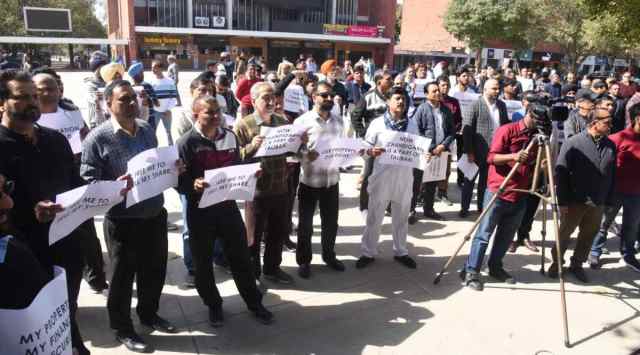Traders, realtors observe ‘black day’ in Chandigarh against curbs on property deals
The protest was organised by property owners in the parking lot in front of Neelam Cinema in Sector 17 following a call by the Chandigarh Property Shareholders Welfare Association.
 The agitating property dealers and traders said they were giving “an ultimatum to the administration" over the issue.
The agitating property dealers and traders said they were giving “an ultimatum to the administration" over the issue. Traders and realtors in Chandigarh observed a ‘black day’ on Sunday against the standard operating procedures (SOPs) issued by the administration in connection with property deals following a Supreme Court order on apartmentalisation.
The protest was organised by property owners in the parking lot in front of Neelam Cinema in Sector 17 following a call by the Chandigarh Property Shareholders Welfare Association. The agitating property dealers and traders said they were giving “an ultimatum to the administration” over the issue.
“If the Chandigarh administration does not revise the SOP in a week, we will sit on a hunger strike,” Jitendra Singh, former national hockey player and the general secretary of the association. Almost all traders’ organisations as well as those of builders participated in the protest. They were joined by BJP leader Devinder Babla and Congress unit chief H S Lucky.
Raising slogans, various property owners said they felt “cheated after the Chandigarh administration issued the SOP following apex court’s orders on apartmentalisation.”
What does the Chandigarh administration’s order say?
On February 9, a month after the apex court judgment banning apartmentalisation in the heritage sectors (Sectors 1-30) of Chandigarh, the administration announced that “mutations will be carried out for all deeds (i.e. sale deed/transfer deed/gift deed, etc) that have been registered upto the date of judgment that is January 10, 2023.”
Detailed orders were published by the Chandigarh administration regarding residential buildings to clarify doubts. “Building Plans/Revised Building Plans of only those residential buildings, where all the co-owners belong to the same family (i.e. no co-owner should be stranger/outside family), will be considered as per Rules. All kinds of transfer of property within family through Sale Deed/Transfer Deed/Gift Deed/WILL/Intestate Death, etc will be allowed irrespective of the share held,” the order had stated.
It was also specified that “WILLs bequeathing shares only within family members will be considered and transfer in which 100% property is being purchased by either a single person or multiple persons belonging to the same family, will be allowed irrespective of the fact whether present owners are members of the same family or strangers/outside family.”







